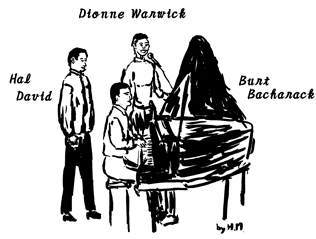

My first encounter with Dionne Warwick was Heartbreaker in the time when I chased the U.S. hit charts. This tune was written and produced by the Bee Gees, while I had not realized it at that time. Surging and rising by her stable alto voice, the ballad with good melody is well produced and I was well fond of it. When I hear Dionne's Arista years' best "Greatest Hits 1979-1990" including the song, I recall the fact that such graceful tunes for adults had been much valued by FM stations and particularly Dionne's of duets had been on air frequently. Arista was one of the key companies which resurrected soul artists with disco tunes or black contemporary ones, however, these sides in vogue are likely to be easy to listen but lacking in unexpected freshness or excitement, which can be found in the songs of the 60's and 70's I fixed myself to love. Especially, I cannot afford such ballads as only the melody of chorus is thrown into your memory and ignites you by force. Despite it, That's What Friends Are For with Stevie Wonder, Gladys Knight and Elton John for the AIDS fund, and Love Power with Jeffrey Osborne are still good because I feel the flow and the link of melody in them, though they are too sentimental or too exaggerated. It is natural because these tunes are produced by Burt Bacharach who made most of Dionne's tunes in her prime, and it can be said that his songs and Hal David's lyrics and Dionne's readings had been in union with the same fate.
Dionne Warwick was born in New Jersey and sang gospel as a member of a church choir, and then formed a group the Gospelaires with her sister Dee Dee and her aunt Cissy Houston (the mother of Whitney Houston). They polished their skills by doing backing vocal jobs at the studios of New York. Orchestrated pops had flourished in New York around 1960 and various writers of 'the Brill Building' produced tunes one after another. Burt Bacharach and Hal David were the dwellers of it. They found Dionne's gift and had her signed with Scepter, a recording label, and then the collaboration of three went on until the early '70s. According to the liner notes of her '60s compilations "Her All-Time Greatest Hits" and "Hidden Gems" and the Bacharach collection "The Look of Love", it is generally said that Hal David spawned lyrics first and Bacharach attached melodies to them next and Dionne sang them, some of which became others' demos. Hal David sent Bacharach his lyrics which were sensitive and fearless, free and careless of melodies. For the sake of such lyrics Bacharach himself constructed songs with complex chord progression just like condensing long classic tunes and light rhythms influenced by bossa nova and hard stop-and-go tempos. And then Dionne swiftly read such willful tunes. In addition to her skill as a studio musician, that is, singing true to melodies not like gospel or soul, her gentle and stable alto voice is perfectly in harmony with Bacharach-David works.
I must mention at first that Walk on by, I Say a Little Prayer, Do You Know the Way to San Jose and I'll Never Fall in Love Again should still be heard repeatedly among their tunes of the '60s. Over and above them, the intensity of her debut Don't Make Me Over, the complicated Anyone Who Had a Heart, pretty and terrible Are You There (With Another Girl), staring afar Message to Michael, broad I Just Don't Know What to Do Myself, rocking the cradle Alfie or mighty broadway Promises, Promises and more. These dizzy and colorful and rushing tunes are tremendous. Her interpretations of tunes famous for others like Wishin' and Hopin', Make It Easy on Yourself, (They Long to Be) Close to You, What the World Needs Now is Love, This Girl's in Love with You, The Look of Love or (There's) Always Something There to Remind Me are also good (I don't know why the last had once been titled in Japan as Weight Lifting of Love !). Anyway, you should know more by listening than told.
There are her '60s songs not of Bacharach-David works on "Soulful", which can be found on the web-site of Rhino specialized in mail-order. At the time pop singers like Elvis or Dusty Springfield used to seek the sound of Memphis in the south, and Dionne also read soul hits produced by Chips Moman. She never had a risk to go out of her style and to dyed in soul, however, I feel comfortable in the relaxing and steady rhythms and reverberated timbres. In the mid-70s when she dissolved the cooperation with Bacharach and David, she had a duet with the Philly soul group Spinners, Then Came You. Spinners' best "A One of a Kind Love Affair" contains fine tunes succeeding orchestrated pops of the '60s and gaining soulful voices and grooves. Then Came You is like a tiny present from skillful singers, and it is interesting to me because of the contrast between the soulfulness of Phillipe Wynne and the decided way in singing of Dionne. Although Dionne is often prominent in the painful singing of 'an unrequited love' in Bacharach-David tunes, her career suggests that she should be more than this and wonderful as a pop singer. (2005/10/14)(2007/08/26)